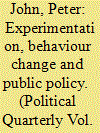|
|
|
Sort Order |
|
|
|
Items / Page
|
|
|
|
|
|
|
| Srl | Item |
| 1 |
ID:
176107


|
|
|
|
|
| Summary/Abstract |
In recent years, an increasing amount of solar energy has been produced around the globe, but too few consumers actually buy it. Three studies now show how this purchase can be promoted with an approach similar to the carbon offset program in aviation. After a fictitious purchase of differently priced appliances (e.g. electric toothbrush or TV set) in an online store, participants could buy a solar certificate for this appliance, whereby its price depended on the appliance's energy consumption as well as the selected term (e.g. 1 or 3 years) of the certificate. By purchasing such a certificate, the amount of solar energy consumed by this appliance for the selected term would be fed into the Swiss electricity grid. Study 1 showed that participants were willing to buy such a certificate, especially certificates with longer terms. That willingness, however, depended on the “solar certificate price/appliance price” ratio. While Study 2 showed that this purchase is influenced by promotions (e.g., a specific reduction in price), Study 3 showed that this purchase did not lead to a less environmentally friendly behavior afterwards. Appliance-based solar certificates easily available at the point of sale can encourage consumers to buy more solar energy.
|
|
|
|
|
|
|
|
|
|
|
|
|
|
|
|
| 2 |
ID:
167010


|
|
|
|
|
| Summary/Abstract |
Behavioural interventions, such as informational nudges, have become an increasingly popular strategy in demand-side energy management. In particular, home energy reports (HERs) have been used to induce behavioural change among residential consumers. These HERs typically provide peer comparisons of energy use and information about energy savings opportunities. Despite the growing prevalence of HERs and a shift from postal to electronic delivery of HERs, the experimental evidence base of their effectiveness comes primarily from HERs delivered by post from a single vendor (Opower). Whether that evidence generalises to other programmes and to the electronic delivery of HERs is unclear. This paper reports new evidence for HER effectiveness from a 12-month field experiment with approximately 9,000 households that tested electronic HER programme in a deregulated American residential electricity market. Despite high non-compliance with HER delivery, the programme reduced household electricity consumption by 2.9%, 95% CI [-5.0%, −0.76%]. This estimated reduction is consistent with prior estimated impacts of HERs delivered by post and implies electronic HERs are at least as effective as reports delivered by post in reducing electricity consumption, while they are administered at a lower cost.
|
|
|
|
|
|
|
|
|
|
|
|
|
|
|
|
| 3 |
ID:
190907


|
|
|
|
|
| Summary/Abstract |
Since the mid-2000s, the fear of “homegrown” terrorism in most developed democracies has prodded police to partner with local Muslim communities as a proactive and preventive approach to Islamic extremism. However, despite practical variations, this model of counterterrorism community policing (“CTCP”) has faced a comparable challenge—the lack of legal and moral legitimacy within counterterrorism law enforcement which erodes Muslim communities’ trust and confidence in policing. Drawing on common critiques of CTCP in the U.S., the U.K. and Australia, this article aims to proffer a behavioral-economics view to promote intended goals of CTCP. Borrowing the ideas of Nudge Theory, my discussion suggests that community engagement within CTCP could be stimulated more effectively through a subtle process of trust building whereby residents are coaxed toward cooperation through indirect encouragement, assistance and facilitation. Through a case study of CTCP in Muslim communities, it is argued that nudge entails the refrainment of the political and media narrative from conflating Islamist ideology with the prime source of domestic terrorist danger. At the grassroots level, the nudge-oriented CTCP is contingent upon community representatives taking on a more active and forefront role in CTCP with police reducing their visibility to only facilitate in the background.
|
|
|
|
|
|
|
|
|
|
|
|
|
|
|
|
| 4 |
ID:
122485


|
|
|
|
|
| Publication |
2013.
|
| Summary/Abstract |
Citizens will need to change their behaviour in pro-social ways if governments are to address current challenges in public policy. But how best to promote behaviour change? The argument in this article is that a decentralised rather than a top-down approach is particularly suitable, which can encourage innovation in the public sector and involve citizens in the implementation of policies. As a method of evaluating interventions, randomised controlled trials have a unique role to play in improving the design of policies, particularly if carried out responsively and adaptively. A culture of experimentation would value curiosity, feedback and the continual testing of interventions. The article includes three examples of experimentation: young people's political attitudes, voter turnout and donations for charity. As the popularity of 'nudge' interventions grows-shown by the success of the UK government's Behavioural Insights Team-the practice of experimentation in the public sector could become the norm.
|
|
|
|
|
|
|
|
|
|
|
|
|
|
|
|
| 5 |
ID:
190982


|
|
|
|
|
| Summary/Abstract |
Overseas diasporas have long been exploited by terrorist organisations seeking funding and support from areas beyond their operation. The Kurdistan Worker’s Party (PKK), active in south-eastern Turkey, is no exception and maintains a significant international presence. This paper uses seventy-three survey responses and thirteen interviews amongst London’s Turkish and Kurdish diaspora to provide an original and comprehensive insight into the PKK’s overseas operations, including their offending patterns, methods, hotspots, offender/victim profiles and existing countermeasures. Respondents were also consulted on new community-based prevention measures designed to address limited law enforcement responses and the laissez-faire approaches of diaspora host countries. This strategy, which combines crime science and behavioural economic theories, consists of Clarke’s “Situational Crime Prevention” theory and Thaler and Sunstein’s “Nudge” theory (SCP+N). The results indicate that the PKK creates criminal opportunities by “legitimising” itself across diasporas by invoking ideological sympathy and social dependence (conceptualised as “constructed legitimisers”), ensuring minimal resistance to its activities. SCP+N is motivated as an effective counterstrategy, addressing both the rational and impulsive nature of offending. The overall theoretical contribution of this paper is to assess overseas terrorist financing through a prevention-oriented, situational and behavioural framework, and to propose a community-based strategy to effectively counter such activities.
|
|
|
|
|
|
|
|
|
|
|
|
|
|
|
|
| 6 |
ID:
092398


|
|
|
|
|
| Publication |
2009.
|
| Summary/Abstract |
This paper reviews two contrasting approaches governments use to engage the citizen to promote better public policy outcomes: nudging citizens using the insights of behavioural economics, as summarised by Thaler and Sunstein (2009) or giving citizens the space to think through and debate solutions, as indicated by proponents of deliberative democracy. The paper summarises each approach, giving examples; then it compares and contrast them, illustrating their relative strengths and weaknesses. The paper concludes by suggesting that the approaches share some common features and policy-makers could useful draw upon both.
|
|
|
|
|
|
|
|
|
|
|
|
|
|
|
|
|
|
|
|
|